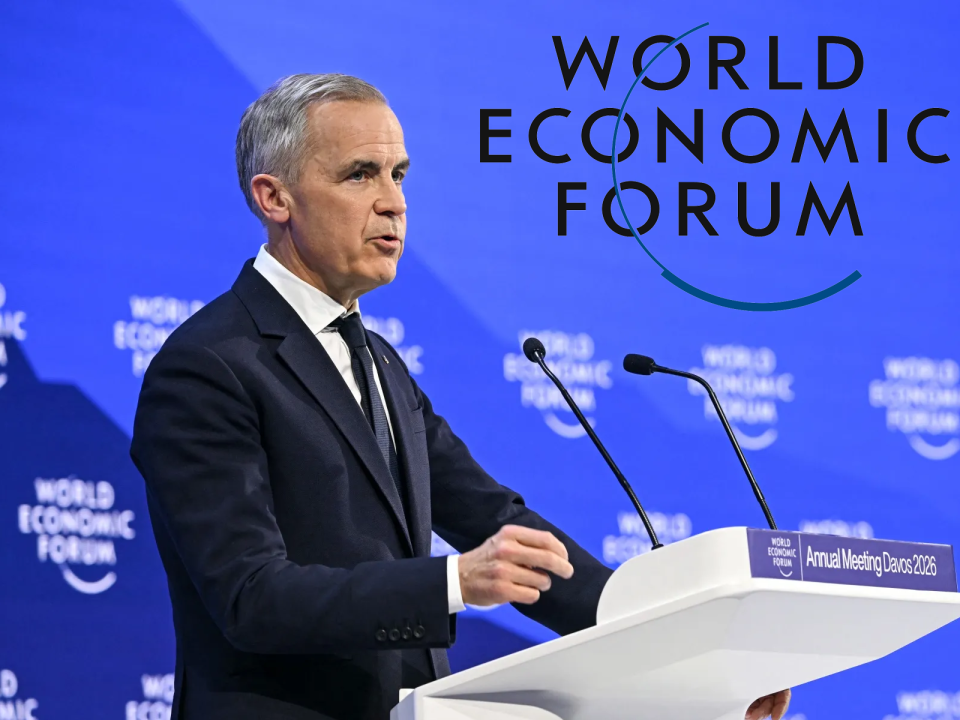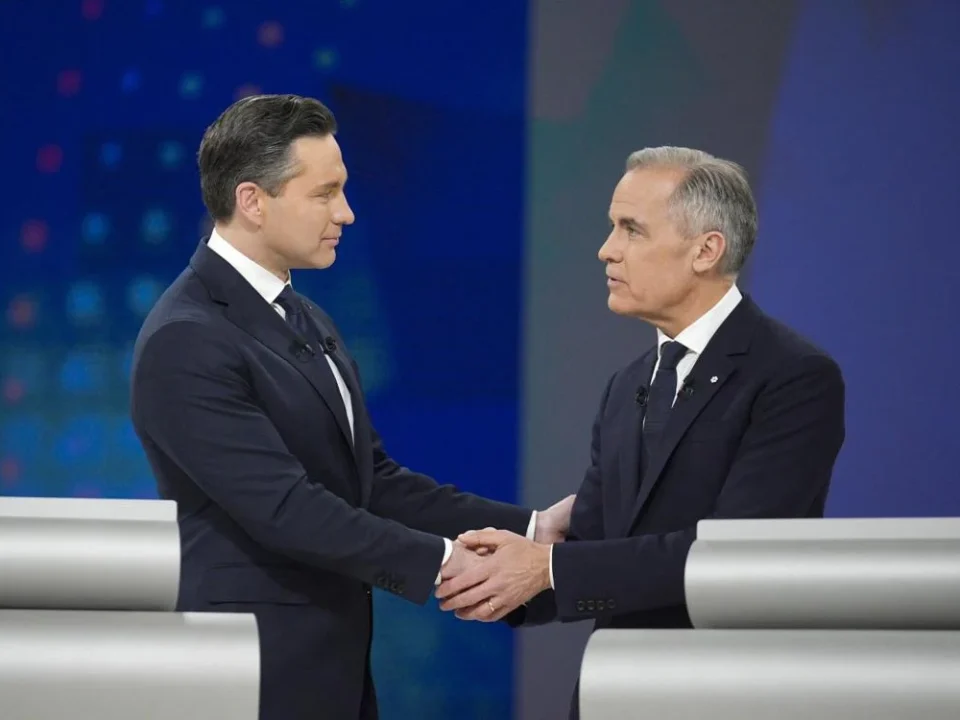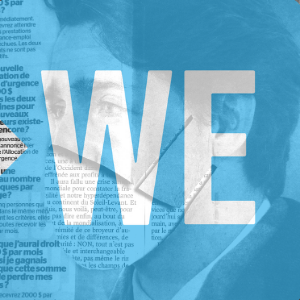
We Controversy’s splash fails to dampen Liberal prospects … so far.
Even though the WE controversy continues to crowd out other key mentions about the federal government, Prime Minister Trudeau and the Liberal Party’s overall vote and approval numbers remain strong. Digging into the WE controversy, however, there may be bigger problems ahead for the Liberal brand among its base, the Left, and undecided voters.
On Vote and Approval, Trudeau Holds Steady
The federal political landscape is largely unchanged since the WE controversy heated up this summer. Four-in-10 (40%) decided voters plan to vote for the Liberal party, with no change since July (40%). Similarly, less than 3-in-10 (28%) planned to vote for the Conservatives in June with no movement this month (28%). 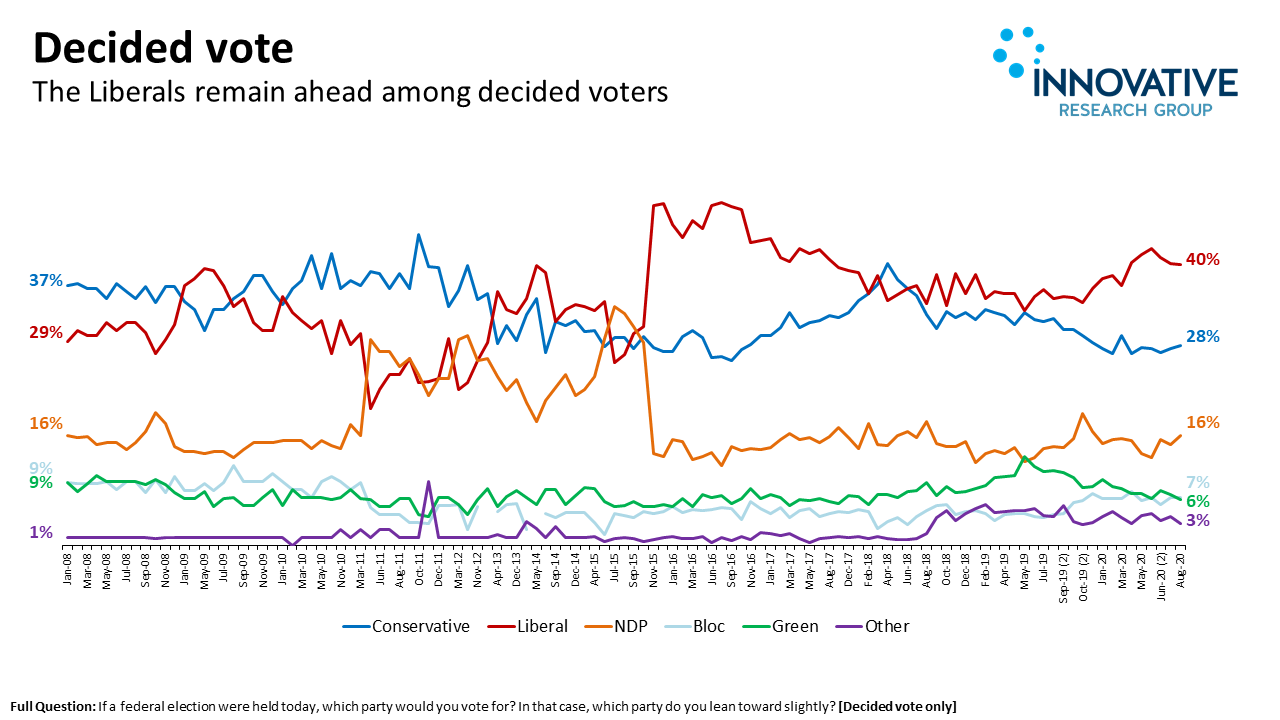
On approval, a slim majority (53%) are satisfied this month with the performance of Justin Trudeau and the Liberal government, compared to 54% in July.
Prime Minister Trudeau’s favourable numbers have remained slightly positive (+2) and steady, significantly ahead of opposition leader Andrew Scheer (-31%) and Trudeau still holds a 2-1 lead on who would make the best Prime Minister (47%) ahead of both the CPC’s Scheer (22%) and the NDP’s Singh (21%). ‘Best PM’ is the only measure where Trudeau has dipped slightly, with a drop of four points on Best PM since July (51%).
The WE Controversy Lingers, but May Be Fading
The WE controversy first emerged as a top issue in our July poll, conducted from July 14th to 20th. While it is still the most mentioned issue, fewer people are now paying attention to any issue:
- In July, nearly half (45%) of Canadians recalled hearing something recently about the WE Charity, with 66% of those people reporting a less favourable impression of the PM and the Liberal government afterward.
- Now, only about a third (34%) of Canadians recall the controversy, down 11 points month-to-month. It remains a strongly negative mention for the government (60% less favourable) but shows a six-point improvement in July.
Other key mentions include a general discussion of COVID-19 with mostly positive impact (52% more favourable) and Trudeau’s recent vacation with mostly negative effect (65% less favourable). 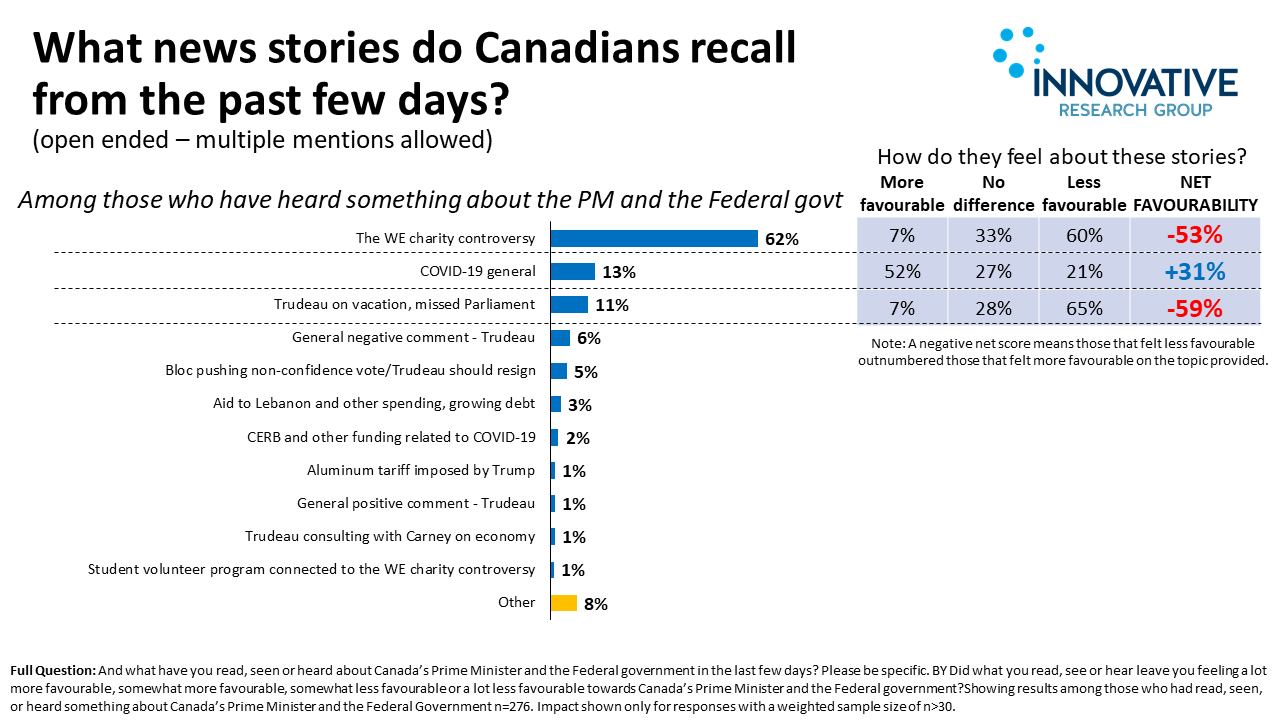
WE Controversy In-Depth
While the Liberal numbers are holding, there may be a deeper problem for Trudeau and the Liberal brand in the months to come within their camp and among the Left and Unaligned.
Nearly half (47%) of Canadians disapprove of the way Justin Trudeau has handled the WE controversy, including a third (33%) who “strongly disapprove.” This question shows potential vulnerabilities to the party on party identification, with 1-in-4 (27%) Liberals and nearly half (46%) of Unaligned, who say they disapprove of the Prime Minister’s actions.
Canadians, by-and-large, don’t see WE as a one-off problem. Nearly half (47%) say the controversy is a sign of deeper issues with Prime Minister Trudeau and the Liberal government, while only 3-in-10 (31%) say it is a unique event that does not affect how the party will act in the future. This creates the potential for WE to serve as a proof point in the case for time-for-a-change given its impact on key voting segments such as Liberal partisans (23% “deeper problems”), NDP partisans (49%), and the Unaligned (42%). 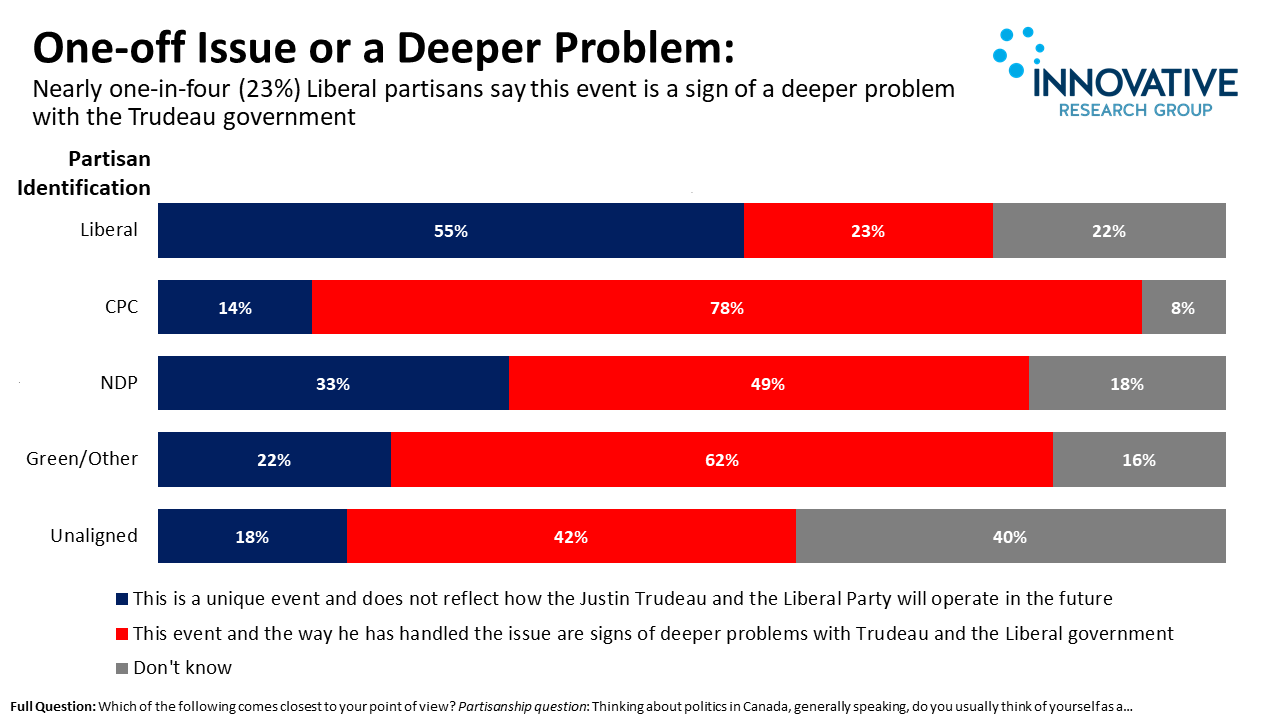
Bill Morneau, for his role in the WE scandal, is seen by Canadians to have had a direct conflict of interest (42%), because of connections to WE and the benefits he and his family received. Only 16% say there was not a direct conflict of interest, but an appearance of one.
However, while Bill Morneau has departed, it appears that a plurality of Canadians see the Prime Minister Trudeau as equally culpable. More than 4-in-10 (43%) say Trudeau had a direct conflict of interest because of his connections and family benefits, while only 1-in-4 (23%) don’t think there was a direct conflict. A large number of people currently don’t know enough about the issue to say (27%). A significant number of the Liberal base (24%), the Left (NDP: 38%; Green/Other: 55%), and Unaligned voters (37%) all feel Trudeau had a direct conflict of interest. 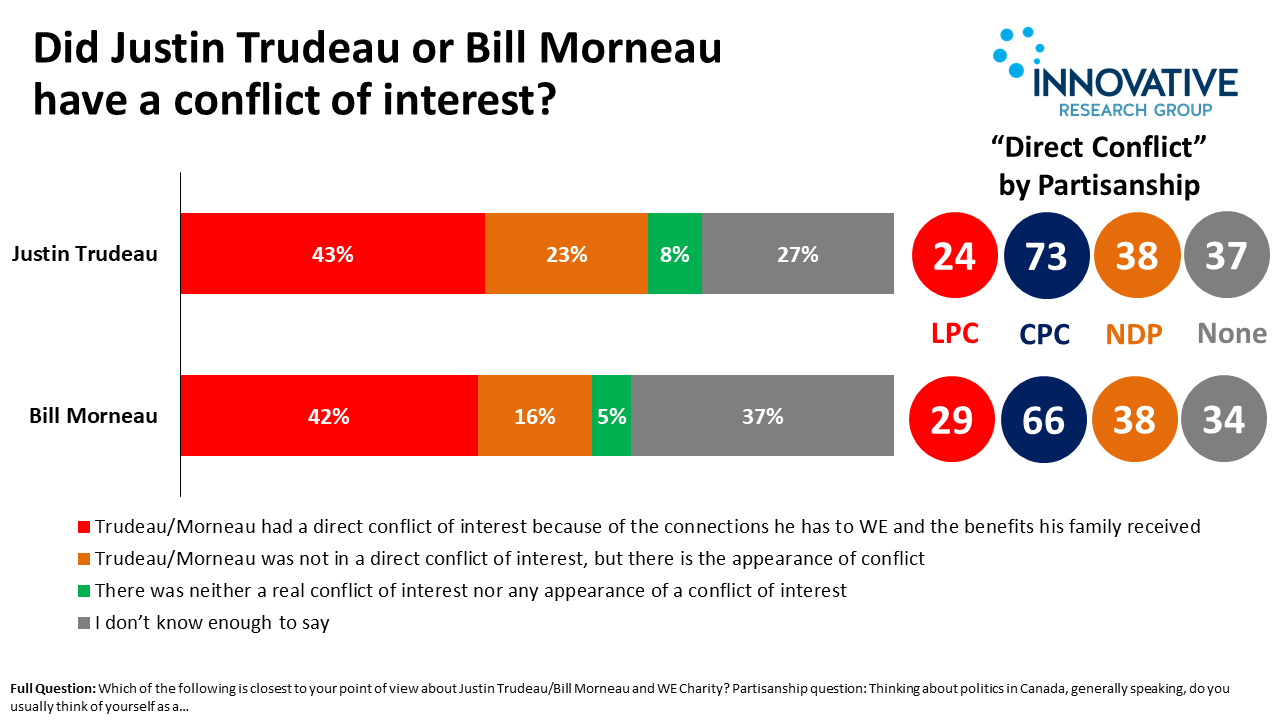
While the steady drumbeat of WE news has not affected voter choice yet, it is clear that the issue remains a significant weakness in the Liberal brand, particularly on their left flank and among undecided voters. Roughly a quarter of the Liberal base and a plurality of Unaligned and Left-identifying partisans have, in question after question, shown disapproval of Trudeau’s role in the crisis. Of course, this issue has to compete against other concerns including COVID. If the spotlight shifts, this issue may well join others such as the India trip, SNC Lavalin and blackface as an issue that dominated for its moment and then faded away.
For detailed results, download our full report here.


